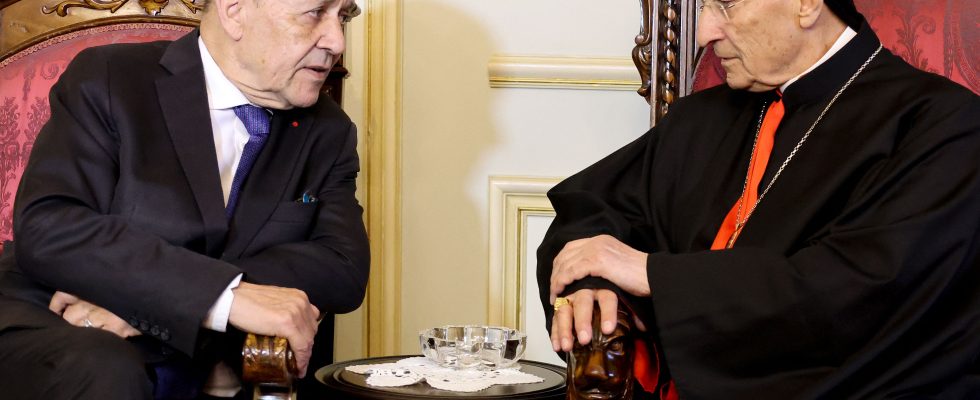The first time he set foot in Lebanon was at the end of the 1970s. Then a young socialist, Jean-Yves Le Drian discovered a country at war, plagued by militias, and a sounding board for the arms of regional railways. Five decades later, it was as Emmanuel Macron’s special envoy that he paid a three-day visit there at the end of June. The former Minister of Foreign Affairs begins his new mission in a context that has become ordinary in the land of the Cedars: that of a vacancy at the top of the State linked to the impossibility of the main players to agree on a compromise, even a minimum.
Lebanon has been without a president for eight months, following the departure of Michel Aoun in October 2022. During the twelfth parliamentary session devoted to the election, the opposition candidate, Jihad Azour, head of the IMF in the Middle East , won 59 votes, slightly more than his main opponent, Sleiman Frangié, a feudal leader supported by Hezbollah and its allies. Neither could reach the bar of 65 votes needed to qualify for the second round and even less than 86 for a victory in the first. Neither of the two, at the present time, seems to be able to be elected to the supreme magistracy, the two camps being buttressed on their position.
A nomination to open a new page
Only a compromise can unblock the situation. In any case, this is what the Élysée is convinced of, which has long supported, behind the scenes, the candidacy of Sleiman Frangié, on the grounds that it appeared to be the most realistic. Paris has the advantage of being able to speak with all the players, but has lost some of its leeway by giving the impression of getting closer to Hezbollah and choosing one camp over the other. “We are now repositioning ourselves as a catalyst for an agreement rather than carrying an exclusive option”, summarizes a French diplomat who requested anonymity. “The French have come out of the previous equation, but they are not in a new equation. They are between the two”, nuance Joseph Bahout, director of the Issam Farès institute at the American University of Beirut.
The appointment of Jean-Yves Le Drian aims to open a new page in this file. The “Menhir” is used to this type of negotiation and can rely on its good relations with Arab leaders, particularly in the Gulf, to try to unblock the situation. During his visit, the former minister toured the actors and above all took the time to listen to them in order to clearly identify the areas of blockage. With all his interlocutors, he also insisted a lot on the “particular affection” he has for Lebanon. In the book of interviews with Jean-Michel Djian (Ouest-France editions, January 2023), Jean-Yves Le Drian confides that he had one regret: that “(their) efforts to help Lebanon (…), have not prevented this country from sinking into crisis and slump”. His new mission sounds like a second chance.
“He is starting from zero,” assures Charles Jabbour, spokesman for the Lebanese Forces, the most virulent party in opposition to Hezbollah. The latter considers that the regional situation is favorable to him because of the détente between Iran and Saudi Arabia.
A soldier appealing to the presidency?
But this new equation, as well as the agreement on the demarcation of the maritime border concluded between Israel and Lebanon last October, could force Hezbollah to refocus on the interior scene where it appears increasingly isolated because of the deterioration of its relations with its main Christian ally, the Free Patriotic Movement, which opposes the candidacy of Sleiman Frangié. The grandson of the former president of the same name is something of a “life insurance” for the Shiite party that he is not ready to give up unless he obtains great concessions in return. “We want a president who does not stab the Resistance in the back,” assured the party’s general secretary, Hassan Nasrallah, last November. But without the support of one of the two major Christian parties, it seems impossible, even for the all-powerful Hezbollah, to have its candidate elected.
Opposite, there is no question of offering the Shiite formation a victory that it is not capable, for the moment, of obtaining on its own, in a context where its militia nature is once again a subject of great polarization in the country. But this camp is marked by the rivalry between the two great Christian leaders, Samir Geagea and Gebran Bassil, and cannot, in any case, impose its candidate on Hezbollah without risking an escalation in terms of security. “The blockage is very clear, but the positive side is that everyone is calling for dialogue,” said the French diplomat. A dialogue that could lead, as was the case in the past, to the election of the commander-in-chief of the army, Joseph Aoun, the troops being the only institution that can claim a certain neutrality.
Spirits do not seem to be ripe enough for a compromise, however. “The Iranian-Saudi rapprochement is producing effects and the two regional powers will probably end up talking about Lebanon”, nevertheless suggests Joseph Bahout. Paris is counting on its good relations with Riyadh to speed up the process, without success so far. Until this materializes, Jean-Yves Le Drian will certainly have to make several visits to Lebanon, the next one being scheduled for this month. The one who described, in December 2020, the country of Cedar as the “Titanic without the orchestra” will have to manage to extricate himself from a situation where so many others before him, including the current French president, have failed. .
